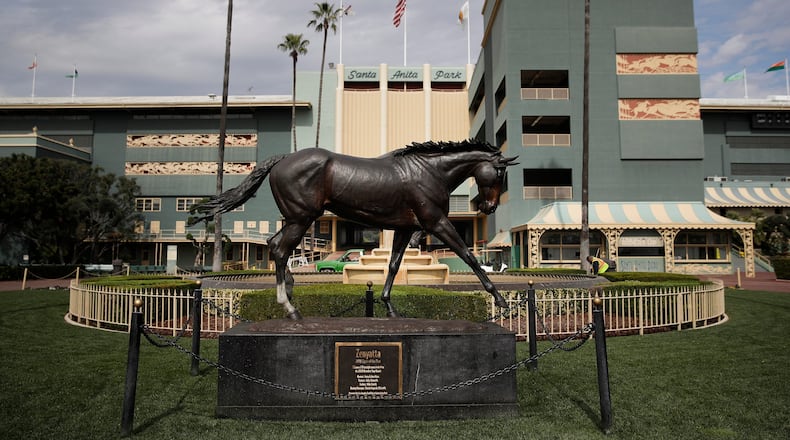Desperate for live sports last weekend, I tuned in for Australian football after midnight. I was kind of starting to get it. I could see watching more Aussie rules over the next few weeks. So naturally at halftime the Australian Football League announced that its season was suspended.
The fallout from the novel coronavirus pandemic forced the AFL to accept the same reality as all other major sports leagues in the world. Stop the games, spectators or not. My ‘footy’ fanhood ended before it really got started and I stayed thirsty for live sports.
(Apparently the Pickleball Mania World Championship streamed live on Thursday. Normally I’d poke fun at such a thing but, under the circumstances, I’m sorry I missed it.)
But there’s another option if, like me, you are longing for live sports. As of Saturday, the horses were still running (sans spectators) at a handful of racetracks across the U.S. You can watch them on NBC Sports, Fox Sports 1 and TVG Network.
Normally, I wouldn’t bother with the suggestion. Horse racing is invisible here. The closest tracks aren’t close: Tampa, New Orleans and Louisville, Ky. Surrounding states allow bettors to open accounts and place wagers via phone or internet, but it’s not an option in Georgia.
But, for now, horse racing essentially is sport’s only live show. It may not last much longer. There are downsides to having the spotlight alone. Running races while the rest of the sports world shuts down can irk the public and government officials.
Gulfstream Park continued racing even after jockey Javier Castellano tested positive for COVID-19 during a physical at the track Tuesday. It's not clear where and when he contracted the disease. Castellano last rode at Gulfstream on March 15 but had since returned to New York to spend time with family, his agent told The Blood-Horse.
Earlier in the week, Broward County issued an executive order that closed businesses it considers nonessential. The Sun-Sentinel reported that a county attorney informed Gulfstream that racing isn’t an essential business. The track kept racing, citing the care of horses as justification.
Patrick Cummings, executive vice president of industry advocate Thoroughbred Idea Foundation, argues that racing thoroughbreds is part of that care.
“Keeping them racing and active is something that is going to happen whether or not we have a shutdown,” Cummings said.
Racing them for simulcast keeps the gambling cash flowing. Horse racing’s status as the only option might mean more of it. If not, then some cash flow is better than none for a struggling sport. The pandemic already has affected its showcase races.
The $12 million Dubai World Cup, scheduled for March 28, was canceled. The most prestigious event, the Kentucky Derby, was moved to September from May. That also means later dates for the Preakness and Belmont, Triple Crown’s other two legs.
The races running now are mostly at the sport’s lower levels. That’s where owners, trainers and jockeys are trying to scratch out a living in a declining industry.
“When people bet on races, that funds the prize money so people can pay their bills,” Cummings said. “As much as they say it’s the ‘sport of kings’ I don’t know a lot of people who get into horse racing and make money.”
I’ve contributed to some of those bills over the years. I occasionally wandered down the street to Churchill Downs while attending college in Louisville. My regular trips to Las Vegas usually include some time in the sportsbooks betting on the ponies.
Now, with the sports schedule barren, I’m glad to watch the horses run even when I can’t get down a bet.
About the Author
The Latest
Featured


